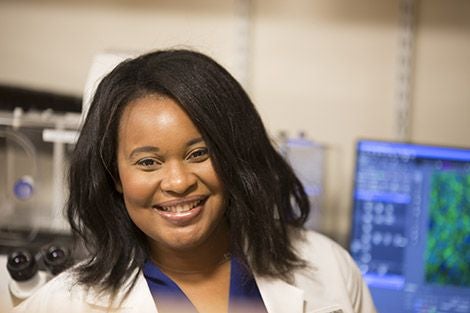December 13, 2016 – Christalyn Rhodes has been named a 2017 Harvard University Horizons Scholar. Rhodes is a Ph.D. student in Biological Sciences in Public Health at Harvard T.H. Chan School of Public Health, and her thesis research focuses on how lung cells migrate in disease states. The Horizons Scholar award recognizes doctoral students whose work has the potential to reshape their disciplines. From across Harvard, Rhodes was one of only eight chosen for the honor.
In April 2017, Rhodes, along with the other Horizons Scholars, will give “TED”-style talks at Harvard’s Sanders Theatre. The group forms the fifth class of the Society of Horizons Scholars, a fellowship cohort that provides students with opportunities for professional and academic growth. To prepare for her talk, Rhodes will receive in-depth mentoring over the next few months on the art of effective presentation. Rhodes’ talk will focus on the movement of lung cells in asthma and viral infection.
For the past three years, Rhodes has worked in the labs of Jin-Ah Park and Jeffrey Fredberg at Harvard Chan School, on research at the intersection of physics and biology. They have found that, in people with asthma, the epithelial cells that line the lungs swirl about in an “unjammed” fashion, unlike normal cells, which exist in a “jammed” state like tiles on the floor.
More recently, the researchers were surprised to find unjammed cell movement in people with a common cold. “No one knew that viruses could make cells move,” Rhodes said. “Our data are the first to show that when you get a viral infection, cells begin to travel.” While it’s been known that viral infection can be an asthma trigger, and has been implicated in disease progression, how this happens has remained unclear. The recent discovery suggests new paths for looking at cell behavior in infections and in asthma—and the relation between the two—and may also be important for studying cancer, in which epithelial cells and their migration play major roles.
Rhodes said she became interested in attending graduate school while working as an electronic microscopist at the Children’s Medical Center of Dallas, studying a disorder called primary ciliary dyskinesia, which is characterized by chronic respiratory tract infections.
“On a weekly basis I would see children coming in with chronically recurring cold infections because of a poorly functioning thin layer of cells that line the lung,” Rhodes recalled. “My heart was broken for these children and I wanted to study the cells and their function and how that related to disease states—and that led me to Jeff and Jin-Ah’s work.”
Fredberg, professor of bioengineering and physiology at Harvard Chan School, called Rhodes “incredibly curiosity-driven.” Park, who is Mark and Catherine Winkler assistant professor of airway biology, praised Rhodes’ energy and enthusiasm. “She is really able to bridge the fields of physics and biology in a very creative way,” Park said.
Rhodes is excited about the opportunity to share details of her research, which involves advanced microscopy techniques and novel ways of analyzing images to probe how epithelial cells react in various disease states, at next April’s talk.
“Our project has lots of generalizable applications and contributes much to our current understanding of asthma—how people develop asthma and why people have asthma attacks,” she said. “I want to share what we’ve learned with as many people as I possibly can, and being a Horizons Scholar seems like a really great platform to do that.”
photo: Sarah Sholes
